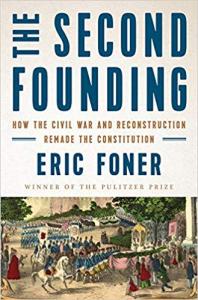 THE SECOND FOUNDING: How the Civil War and Reconstruction Changed the Constitution
THE SECOND FOUNDING: How the Civil War and Reconstruction Changed the Constitution
Norton, 2019
Agent: Sandra Dijkstra
From the Pulitzer Prize–winning scholar, a timely history of the constitutional changes that built equality into the nation’s foundation and how those guarantees have been shaken over time.
The Declaration of Independence announced equality as an American ideal, but it took the Civil War and the subsequent adoption of three constitutional amendments to establish that ideal as American law. The Reconstruction amendments abolished slavery, guaranteed all persons due process and equal protection of the law, and equipped black men with the right to vote. They established the principle of birthright citizenship and guaranteed the privileges and immunities of all citizens. The federal government, not the states, was charged with enforcement, reversing the priority of the original Constitution and the Bill of Rights. In grafting the principle of equality onto the Constitution, these revolutionary changes marked the second founding of the United States.
Eric Foner’s compact, insightful history traces the arc of these pivotal amendments from their dramatic origins in pre–Civil War mass meetings of African-American “colored citizens” and in Republican party politics to their virtual nullification in the late nineteenth century. A series of momentous decisions by the Supreme Court narrowed the rights guaranteed in the amendments, while the states actively undermined them. The Jim Crow system was the result. Again today there are serious political challenges to birthright citizenship, voting rights, due process, and equal protection of the law. Like all great works of history, this one informs our understanding of the present as well as the past: knowledge and vigilance are always necessary to secure our basic rights.
Accolades:
• Selected by Oprah Magazine for 18 Must-Read Books of Fall 2019
• Lit Hub’s Most Anticipated Books of 2019
Reviews:
"Mr. Foner makes his case with brio and erudition."
—Fergus M. Bordewich, The Wall Street Journal
'“The Second Founding” reflects Foner’s rigorously researched, now mainstream view that Reconstruction was “a massive experiment in interracial democracy”; the changes wrought by the Civil War amendments were the product of decades of debate and so radical that they represented, in the words of one Republican leader, “a constitutional revolution.”... Foner’s authority and magnetism as a Bancroft- and Pulitzer Prize-winning scholar stem partly from his conviction that history is neither primarily about the past nor, as he put it in “Who Owns History” (2002), “simply a series of myths and inventions.”'
—The New York Times Book Review
"Readers invested in social equality will find Foner's guarded optimism about the possibility of judicial activism in this area inspiring, and both casual readers and those swell-versed in American legal history will benefit from his clear prose and insightful exploration of constitutional history."
—Publishers Weekly
"It feels especially important, right now, to be reading about both the Constitution and the Civil War. The Second Founding traces the history of the Reconstruction amendments, which abolished slavery, granted all people equal protection under the law (theoretically, anyway), and gave black men the right to vote. Sounds like a necessary read."
—Jessie Gaymor, Literary Hub